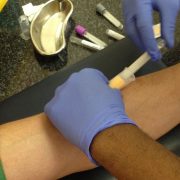Screening for Prostate Cancer – Don’t wait ’till it’s too late!
At what age should South African men consider going for screening?
Informed patient-based screening is recommended in men with a life expectancy of more than 10 years in the following situations:
– From the age of 40 in black African men and in men who have a family history of prostate and/or breast cancer in a first degree relative.
– From the age of 45 years for all other men
In addition, patients with a history of lower urinary tract symptoms (LUTS) and/or clinical suspicion of prostate cancer, regardless of age group, should have their PSA tested.
How often should you go for screening?
If you decide on screening this should be done every year. This improves the chances of detecting prostate cancer in the early stages before it has spread outside of the prostate.
What are the recommended screening tests for prostate cancer?
The Prostate Specific Antigen (PSA) test
Prostate specific antigen is a type of protein that enters the blood when the barriers in the prostate are damaged. It is a simple blood test that gives an indication of whether something is wrong with your prostate. It is not a cancer specific test. A high PSA test result could be caused by:
- an enlarged prostate
- inflammation of the prostate (prostatitis)
- a urinary tract infection
- prostate cancer
Avoid the following activities for 48 hours before a PSA test:
- cycling
- ejaculation
Your PSA may not be accurate:
- if you have an active urinary tract infection
- after recent urinary tract instrumentation and/or urinary retention
- if you have had a prostate biopsy in the previous 6 weeks
- if you are taking medication such a finasteride or dutasteride for an enlarged prostate or hair loss (5-alpha reductase inhibitor)
Normal PSA Scores
A PSA of ≥4.0 ng/mL is regarded as high and requires referral to a urologist for further investigation. However, PSA levels generally increase with age, so some doctors will use age-specific ranges and recommend further investigation if scores fall outside of the norm for a specific age category. This will improve diagnosis rates and give an indication as to whether further investigation is required. The SA Prostate Cancer Guidelines use the following as a guide:
- 40 – 50 years 0 – 2.5 ng/mL
- 50 – 60 years 0 – 3.5 ng/mL
- >60 years 0 – 4.0 ng/mL
Chances of having prostate cancer diagnosed for a PSA ≥4.0 ng/mL is approximately 25%
Chances of having prostate cancer diagnosed for a PSA ≥10 ng/mL is approximately 60%
Measuring Free PSA
This is a variation of the normal PSA test that is used to distinguish between men who have an enlarged prostate as opposed to prostate cancer. It measures PSA that is not bound to protein in the serum.
PSA Velocity
If you have been having regular PSA tests over 1 to 2 years and there are more than 3 test results available your doctor will also check to see how much the PSA score has changed over time. If the PSA changes by more than 0.75ng/ml in a year, this can give an indication of potential prostate cancer even though the score is still within the normal range.
A Digital Rectal Examination (DRE)
A lot of men are embarrassed about this test but it is quick and there are only a few seconds of minor discomfort. The examining doctor inserts a gloved and lubricated finger into the rectum so that they can feel the prostate for any abnormal lumps, hardening, asymmetry or a lack of mobility.

What happens if screening tests show that there is a problem?
When screening gives an indication that there is a problem with the prostate, men will generally be referred to a urologist for further investigation. A prostate biopsy is used to diagnose prostate cancer. A biopsy involves inserting a number of needles into the prostate in order to obtain a small sample of the prostate cells which are then sent to a laboratory to be checked for cancer. This procedure carries a risk of infection and other complications in a small percentage of cases. (See article on prostate biopsy)

